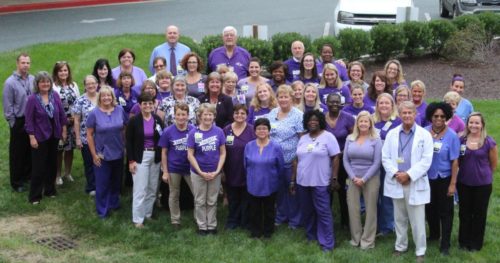UM SRH Team Members Support Purple Campaign

University of Maryland Shore Regional Health - Easton team members wear purple in honor of the month-long Shore Health Goes Purple campaign.
EASTON — The University of Maryland Shore Regional Health team members wore purple Friday afternoon, Sept. 21, to show their support for the month-long observance of Shore Health Goes Purple.
Team members in Talbot, Caroline, Dorchester, Kent and Queen Anne’s counties participated. They wore purple and posed for photos in front of the health system’s three hospitals — University of Maryland Shore medical centers at Easton, Chestertown and Dorchester.
“Having the region’s health care system show strong support for our efforts to reduce deaths and addictions associated with opioid abuse is so important to me,” said Ken Kozel, CEO of Shore Regional Health. “We see the effects every day and will continue to work hard to demonstrate our support and play an active role in our community’s efforts to attack this crisis.”
During the three-year period 2014-2016, visits to UM SRH emergency departments (Chestertown, Dorchester, Easton and Queenstown) for heroin/opiate poisoning more than doubled, from 90 to 187. These poisonings were caused by overdose of heroin, methadone, opiates and opium.
According to the Maryland Department of Health, there were 2,282 drug and alcohol-related intoxication deaths in Maryland in 2017, and 2,009 of those were opioid-related. Preliminary data from the first three months of 2018 indicate there were 653 unintentional drug- and alcohol-related intoxication deaths in Maryland. There were 579 opioid-related deaths, 500 of which involved fentanyl.
“Ever since I have been working on emergency departments, it’s always been present for us,” said UM Shore Medical Center at Chestertown ER Dr. David Zamara. “From 15 years ago, we were seeing heroin overdoses in the emergency department. To be honest, we’ve been seeing more people, and it has been getting worse.
“Opioid addiction is every family of every race, of every socioeconomic status. It’s no longer someone you don’t know; now it is your brother, sisters, mother or father. Being aware of it is important.”
The University of Maryland Shore Regional Health has convened a regional opioid task force that includes representatives of county health departments and emergency services, emergency and behavioral health physicians, and nurses and hospital officials. The force is led by Dr. Walter Atha, regional director of emergency medicine for UM SRH, and Roger Harrell, Dorchester County health officer.
The Regional Opioid Task Force was formed to coordinate and standardize the medical community responses to the rising incidence of opioid and heroin overdose in Caroline, Dorchester, Kent, Queen Anne’s and Talbot counties.
The task force has 35 members and began meeting in June 2017. It is addressing a number of issues, including improving the opioid/heroin overdose response process in emergency care settings in a way that will support the likelihood of overdose patients’ accepting treatment for their addiction; identifying and implementing strategies to improve the likelihood of patients’ successful referral to treatment; involving law enforcement in the process at the health care level; and sharing the data needed to assess opioid and heroin overdose trends and outcomes of EMS and hospital responses to overdose.
The task force also is reviewing the continuum of care for post-overdose patients, from emergency care to detox and long-term support.
The University of Maryland Shore Regional Health also would like for the community to participate in purple events, including two free screenings of the film “If Only,” presented by the Mark Wahlberg Youth Foundation and Millennium Health. The short film aims to raise awareness about the dangers of teen prescription drug misuse and abuse.
Screenings are set for 6:30 p.m. Sept. 25 at Easton High School and 6:30 p.m. Sept. 26 at St. Michaels Middle High School. Each event will include an information resource fair at 5:30 p.m.
“Treatment works and people recover,” said Tracie Nolan at Shore Behavioral Health in Cambridge. “We can help people. We see people recover. That is the road we help people get to.”
More information is available at www.talbotgoespurple.org, Facebook under @TalbotGoesPurple or through email at talbotgoespurple@gmail.com. For more information, visit www.umms.org/shore.
This article originally appeared in The Star Democrat on Sunday, September 23, 2018. Written by Christina Acosta, cacosta@chespub.com. Jack Rodgers and Dustin Holt contributed to this article.


